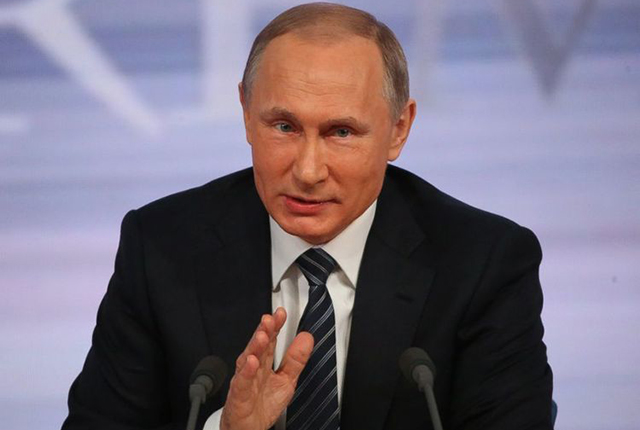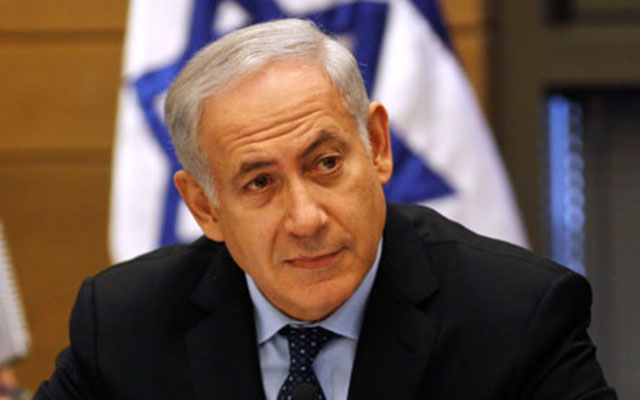Russia ‘reserves the right’ to retaliate: Putin

MOSCOW. – Russian President Vladimir Putin said yesterday that Russia “reserves the right” to retaliate for the US expulsion of 35 Russian diplomats but that Moscow did not plan on expelling US envoys in return.
Putin said Russia would respond to the new US sanctions but would first consider the policies of President-elect Donald Trump.
“Reserving the right to retaliatory measures, we. . .will be planning our next steps in restoring the US-Russian relations based on the policies pursued by the administration of President Donald Trump,” Putin said in a statement released by the Kremlin.
But he denied media reports that Russia was planning to expel US diplomats.
“We will not expel anyone,” Putin said in a statement on the Kremlin’s website.
He dismissed the new US sanctions announced on Thursday as a “provocation aimed at further undermining Russian-American relations”.
Foreign Minister Sergei Lavrov said earlier yesterday that he had suggested that Russia expel 35 US envoys in return for the US measures. He also said that allegations that Russia had interfered in the November US election were baseless.
US President Barack Obama on Thursday ordered the expulsion of 35 Russian diplomats and intelligence officers and imposed sanctions on two intelligence agencies, marking a new post-Cold War low in US-Russia ties.
The moves came in response to US intelligence reports that Russia hacked officials from the Democratic National Committee and leaked their emails in the weeks before the November 8 election. They add to existing US sanctions over Russia’s actions in Ukraine.
The punitive measures announced by Obama were the strongest his administration has taken to date in response to the alleged Russian cyber-attacks targeting US officials, and are more comprehensive than last year’s sanctions on North Korea after it hacked Sony Pictures Entertainment.
“All Americans should be alarmed by Russia’s actions. Such activities have consequences,” said Obama, who is holidaying in Hawaii. He added that Washington could take further, covert action – a thinly veiled reference to a counterstrike in cyberspace that the US has reportedly been considering.
US relations with Russia have suffered during Obama’s years in office as he and Putin clashed over Ukraine, whistleblower Edward Snowden and Russia’s support for Syrian President Bashar Al-Assad.
It is unlikely the new sanctions, while symbolically significant, would have a major impact on Russian spy operations.
The sanctions freeze any US assets held by the 35 Russians and block Americans from doing business with them.
But Russian law bars the spy agencies from maintaining assets in the United States, and any activities they undertake would likely be covert and hard to identify.
Indeed, senior Obama administration officials said that even with the penalties, they had reason to believe Russia would keep launching cyber-attacks with the aim of influencing other nations’ elections and might well try again during US polls in 2018 or 2020.
Though the FBI and Department of Homeland Security issued a joint report on “Russian malicious cyber activity” – replete with examples of malware code used by the Russians – it still has not released a broader report that Obama has promised that would detail Russia’s efforts to interfere with US elections.
The report has been eagerly anticipated by those hoping to make it politically untenable for President-elect Donald Trump to continue dismissing allegations that Russia was involved in hacking Democratic officials.
Indeed, Obama’s sanctions pile the pressure on Trump, who has so far brushed off the allegations that Russian hacking helped him win the presidential election.
Trump will have to decide whether to roll back the measures once in office. But US officials suggest that building up their case against Russia now could make it harder for Trump to justify easing the restrictions later.
Putin spokesman Dmitry Peskov said Russia’s retaliation would take into account the fact that Trump will soon replace Obama as it drafts counter-measures.
Trump’s position has also put him at odds with the Republican-controlled Congress.
US House of Representatives Speaker Paul Ryan said Russia “has consistently sought to undermine” US interests and called the sanctions overdue.
Republican senators John McCain and Lindsey Graham on Thursday said they intended to lead effort in Congress to “impose stronger sanctions on Russia”.
But in a sign that Trump was no longer able to ignore the allegations, he said he planned to meet with US intelligence leaders next week to learn more.
US intelligence agencies concluded that Russia was trying to help Trump when hackers connected to the Kremlin breached Democratic Party computers and stole tens of thousands of emails that were then posted on WikiLeaks, some containing embarrassing information about Democratic infighting.
Clinton aide John Podesta’s emails were also stolen and released publicly in the final weeks of the campaign. – France24/AFP/Reuters.










Comments